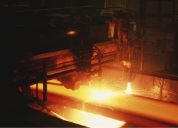Back | Latest news overview
Molybdenum alloying substantially improves delayed cracking resistance in 2000 MPa press hardened steels
15/02/2021

Research, published in Metals Journal, has shown that molybdenum alloying can substantially improve delayed cracking resistance in 2000 MPa Press Hardened Steel (PHS), to a level that is acceptable for automotive applications.
The study, conducted by Professor Hardy Mohrbacher and Professor Takehide Senuma, demonstrated that the standard alloy 32MnB5 used for 2000 MPa PHS is severely sensitive to hydrogen-induced cracking. Alloy modification by adding molybdenum and niobium substantially improved the delayed cracking resistance. Synergies between the two alloying elements were evident, reflecting the highest resistance against hydrogen-induced cracking for Mo-Nb co-alloyed press hardened steels.
Guidance on the most suitable processing conditions for maximizing these alloying effects is also provided.
Professor Hardy Mohrbacher said:
"Press hardening steel is widely used in automotive body design to increase crash intrusion resistance and reduce the weight of vehicles."
"The trend of using PHS grades with strengths above 1500 MPa raises concerns about sensitivity to hydrogen embrittlement. However, we have shown that delayed cracking resistance in PHS with an increased tensile strength of 2000 MPa can be largely enhanced by using a combination of molybdenum and niobium alloying."
"These findings offer important opportunities for auto manufacturers to further increase the sustainability of the vehicles they produce. The increased tensile strength of the steel will lead to increased crash safety as well as lighter and more environmentally efficient vehicles that use less material in their construction, while their reduced weight results in fewer emissions."
"It is clear that PHS is essential to sustainable mobility in the coming years, and is set to play a key role in both the electric and autonomous vehicles of the future, ensuring not only their sustainability but also their safety."
"On a broader scale, the general understanding of molybdenum's interaction with hydrogen gained from this research can be used in many other applications outside the automotive industry, such as ultrahigh strength steels for fasteners, machine building and structural applications."
Notes to editors
- A copy of the research can be found at Metals | Free Full-Text | Alloy Optimization for Reducing Delayed Fracture Sensitivity of 2000 MPa Press Hardening Steel (mdpi.com)
- The research was funded by IMOA
- IMOA represents the majority of the molybdenum industry worldwide, working to raise awareness about the unique properties of molybdenum, its beneficial effects on materials performance, its safety in use and its contribution to sustainable development.
General information for media
IMOA is a non profit trade association, representing the majority of the molybdenum industry worldwide. It works to raise awareness about the unique properties of molybdenum, its beneficial effects on materials performance, its safety in use and its contribution to sustainable development.
Molybdenum is added to alloy steels to improve strength, toughness, hardenability and weldability for numerous applications in the automotive, shipbuilding, construction, mining, chemical, oil & gas and energy generation industries. In stainless steels and superalloys, it improves corrosion resistance and high-temperature performance and finds uses in many industrial applications. It is also used in a variety of products from catalysts and lubricants to pigments and paint.
IMOA has a strict antitrust compliance policy which delegates of all meetings are required to observe. All such meetings are observed by legal counsel.
For more information please email the communications team at media@imoa.info.
For up-to-date information please follow IMOA on Twitter and LinkedIn.
Back | Latest news overview

